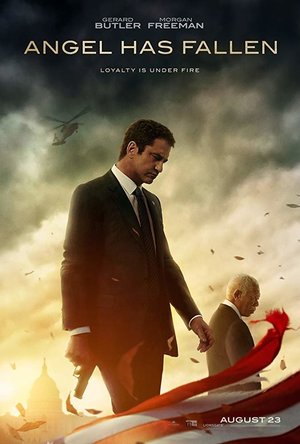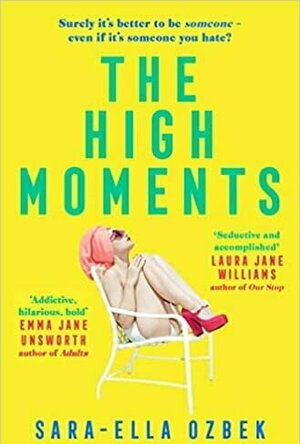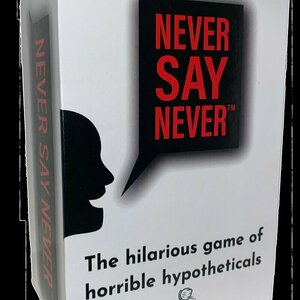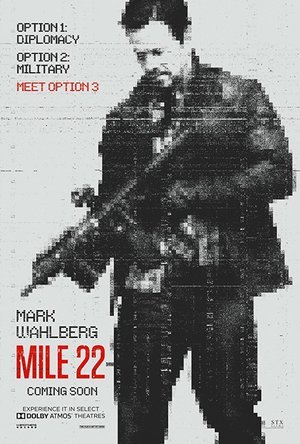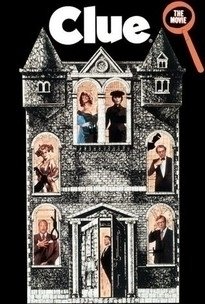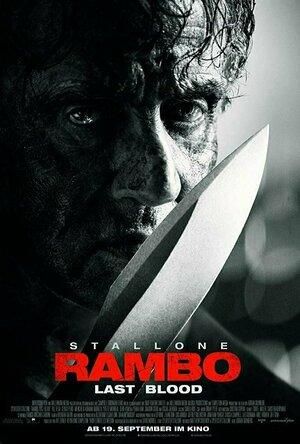Search
Search results

Speech Assistant AAC
Medical and Education
App
Speech Assistant is an AAC app designed for people who are speech impaired. This may be in the case...

Hyena Simulator
Games and Education
App
Enter into the savanna and live the life of a Hyena! Survive in the wild grassy plains of the animal...
Emma @ The Movies (1786 KP) rated Angel Has Fallen (2019) in Movies
Jun 20, 2020
Full review: OMG explodey goodness! End.
Okay fine... the real full review is below.
Mike Banning is now on President Trumbull's secret service detail, past events have left him battered and bruised but he's not ready to stop doing what he was made to do.
When they take a short break so the President can get away from everything Mike is left in a life-changing situation. His team is all dead, the President is in a coma and all the evidence of the incident points to him. He needs to prove his innocence while evading every law enforcement agency that's hunting him, his only advantage? They aren't Mike Banning.
I loved Olympus Has Fallen, it was only narrowly edged out of the top spot the year it came out by White House Down. London Has Fallen was a completely different beast, it was much more aggressive and dark, and while entertaining it didn't feel like it fit with Olympus. Angel was always on my watchlist despite the dubious second instalment. At the very least it was going to be an action film where I didn't really have to think too much.
Angel Has Fallen is entirely predictable, I had two moments where I went "Oh... so this is what's going to happen..." I wasn't even mad that I guessed though, I was having too much fun.
Gerard Butler gets to flex his comedic muscles a bit more (look out for the wire), he does comedy so well that I've always got my fingers crossed for more of it. He mangles a lot of bad guys, naturally, but he managed to work in the fact that Mike isn't the spring chicken he used to be and it's a very convincing act. He also isn't phased by the fact his wife has had plastic surgery and transformed into a completely different woman.
Morgan Freeman reprises his role as Trumbull this time in the office of President. Freeman is one of my favourite actors and he always brings something to his roles. At one point he makes a very brief speech and that tone... it has a magical calming effect and instils great confidence. What are his political views? Is it worth considering him for office?
Nick Nolte also makes an appearance as Mike's estranger father. This leads to some very amusing scenes throughout. I'm not sure if it's because Nolte has the "grizzled back woodsman" look but it doesn't feel quite right that it's a father and son situation. The two have good chemistry though, especially while they're out in the woods.
There are some good and some bad things about the way the film is done. The worst is the CGI. Generally you'll always know where there's CGI in action but it will blend in well enough to be ignored. Some of the time that's true in Angel Has Fallen, but there's a lot that can't be ignored.
When it comes to the camera work it's quite good, you don't feel like you're missing anything and it helps you keep up with the action. There's just one point very early on that sticks out. We get a couple of first person shooter shots and while I understand why they were included it felt very out of place with the tone of everything around it.
After I saw London Has Fallen it felt like the franchise had already given up on itself a bit. Angel has definitely pulled it back. Olympus was a "serious" movie, London went much more ridiculous, and Angel did the only thing it could... go all out action. It feels very much like a classic 80s action storyline and I can't be mad at that.
Originally posted on: emmaatthemovies.blogspot.com/2019/08/angel-has-fallen-movie-review.html
Okay fine... the real full review is below.
Mike Banning is now on President Trumbull's secret service detail, past events have left him battered and bruised but he's not ready to stop doing what he was made to do.
When they take a short break so the President can get away from everything Mike is left in a life-changing situation. His team is all dead, the President is in a coma and all the evidence of the incident points to him. He needs to prove his innocence while evading every law enforcement agency that's hunting him, his only advantage? They aren't Mike Banning.
I loved Olympus Has Fallen, it was only narrowly edged out of the top spot the year it came out by White House Down. London Has Fallen was a completely different beast, it was much more aggressive and dark, and while entertaining it didn't feel like it fit with Olympus. Angel was always on my watchlist despite the dubious second instalment. At the very least it was going to be an action film where I didn't really have to think too much.
Angel Has Fallen is entirely predictable, I had two moments where I went "Oh... so this is what's going to happen..." I wasn't even mad that I guessed though, I was having too much fun.
Gerard Butler gets to flex his comedic muscles a bit more (look out for the wire), he does comedy so well that I've always got my fingers crossed for more of it. He mangles a lot of bad guys, naturally, but he managed to work in the fact that Mike isn't the spring chicken he used to be and it's a very convincing act. He also isn't phased by the fact his wife has had plastic surgery and transformed into a completely different woman.
Morgan Freeman reprises his role as Trumbull this time in the office of President. Freeman is one of my favourite actors and he always brings something to his roles. At one point he makes a very brief speech and that tone... it has a magical calming effect and instils great confidence. What are his political views? Is it worth considering him for office?
Nick Nolte also makes an appearance as Mike's estranger father. This leads to some very amusing scenes throughout. I'm not sure if it's because Nolte has the "grizzled back woodsman" look but it doesn't feel quite right that it's a father and son situation. The two have good chemistry though, especially while they're out in the woods.
There are some good and some bad things about the way the film is done. The worst is the CGI. Generally you'll always know where there's CGI in action but it will blend in well enough to be ignored. Some of the time that's true in Angel Has Fallen, but there's a lot that can't be ignored.
When it comes to the camera work it's quite good, you don't feel like you're missing anything and it helps you keep up with the action. There's just one point very early on that sticks out. We get a couple of first person shooter shots and while I understand why they were included it felt very out of place with the tone of everything around it.
After I saw London Has Fallen it felt like the franchise had already given up on itself a bit. Angel has definitely pulled it back. Olympus was a "serious" movie, London went much more ridiculous, and Angel did the only thing it could... go all out action. It feels very much like a classic 80s action storyline and I can't be mad at that.
Originally posted on: emmaatthemovies.blogspot.com/2019/08/angel-has-fallen-movie-review.html
Sarah (7800 KP) rated It’s A Sin in TV
Feb 7, 2021
Outstanding drama
It’s A Sin is the latest drama from the mind of Russell T Davies, the man behind Queer as Folk, Cucumber and the revival of Doctor Who back in 2005. It follows a group of gay men and their friends in London from 1981 to 1991, depicting how the developing HIV and AIDS crisis impacted on their lives.
The series concentrates on 5 friends who meet in 1981 and move into a flat together. There’s outgoing and smart Ritchie (Olly Alexander), shy and mild mannered Colin (Callum Scott Howells), flamboyant Nigerian Roscoe (Omari Douglas), sweet Ash (Nathaniel Curtis) and outgoing, responsible Jill (Lydia West). It’s A Sin follows the friends as they party and lead promiscuous lifestyles over the 80s, only for the AIDS crisis to slowly weave its way into their lives and affect friends and colleagues closest to them. Each deals with the developing crisis in their own way: Jill fights for AIDS awareness and help for those that are suffering, whereas Ritchie remains in denial and spreads conspiracy theories about AIDS. But by 1991, the lives of the group and their families have been irrevocably changed.
It’s A Sin is a powerful drama about an emotive and serious subject. While it is not based on a completely true story (only Jill is loosely based on a real person, Jill Nalder, a friend of Davies), Russell T Davies has based this around his and his friends experiences of the AIDS crisis in the 80s and watching this you can really believe that these sorts of events happened across the 80s and 90s. The attitudes and experiences shown here, from the hedonistic lifestyles to the rampant denial and conspiracy theories, are terrifying and sadly a true to life depiction of the attitudes at the time, and make for a rather emotional and sometimes harrowing watch.
Despite the serious subject, It’s A Sin isn’t entirely sombre. It starts out as a story of friendship and fun and there are a lot of heartwarming scenes and a surprising amount of laughs. Some might think the uplifting side of this drama detracts from the seriousness of the AIDS crisis, but personally I found the lighthearted scenes helped balance the rather sobering seriousness, especially as the episodes gradually become more and more grave as the crisis progresses. Even the gay sex scenes are fun and made mostly for laughs rather than any sort of eroticism. It’s impressive that Davies has managed to pull off a series that seamlessly blends lighthearted entertainment with a serious topic, without making light of such a harrowing crisis.
It helps that the cast are fantastic. Olly Alexander, who I knew nothing about other than recognising a few Years and Years songs, is an absolute star and a standout as Ritchie. He’s charismatic and engaging and when he’s on screen, you can’t take your eyes off him. The rest of the main cast too are just as good, especially this being their first major tv role in the case of Howells and Douglas. They’re ably supported by a host of seasoned veterans, including Neil Patrick Harris as Colin’s work colleague, Stephen Fry as a closeted MP that Roscoe meets, and Keeley Hawes and Shaun Dooley as Ritchie’s parents. Hawes and Dooley are especially moving and ultimately surprising in the later episodes, when their true attitudes as parents are revealed. My only real criticism of this series is so minor it’s barely worth mentioning, but I did get a little frustrated that Ritchie’s full name was Ritchie Tozer, as this is the same name as Richie Tozier from Stephen King’s IT. Admittedly a different spelling, but it did grate on me a little throughout the episodes as it’s not exactly a common name.
However despite my reservations on character naming, It’s A Sin is a fantastic heartwarming yet sobering drama that can’t be faulted. It’s been a long time since I’ve seen anything so engaging and emotional.
The series concentrates on 5 friends who meet in 1981 and move into a flat together. There’s outgoing and smart Ritchie (Olly Alexander), shy and mild mannered Colin (Callum Scott Howells), flamboyant Nigerian Roscoe (Omari Douglas), sweet Ash (Nathaniel Curtis) and outgoing, responsible Jill (Lydia West). It’s A Sin follows the friends as they party and lead promiscuous lifestyles over the 80s, only for the AIDS crisis to slowly weave its way into their lives and affect friends and colleagues closest to them. Each deals with the developing crisis in their own way: Jill fights for AIDS awareness and help for those that are suffering, whereas Ritchie remains in denial and spreads conspiracy theories about AIDS. But by 1991, the lives of the group and their families have been irrevocably changed.
It’s A Sin is a powerful drama about an emotive and serious subject. While it is not based on a completely true story (only Jill is loosely based on a real person, Jill Nalder, a friend of Davies), Russell T Davies has based this around his and his friends experiences of the AIDS crisis in the 80s and watching this you can really believe that these sorts of events happened across the 80s and 90s. The attitudes and experiences shown here, from the hedonistic lifestyles to the rampant denial and conspiracy theories, are terrifying and sadly a true to life depiction of the attitudes at the time, and make for a rather emotional and sometimes harrowing watch.
Despite the serious subject, It’s A Sin isn’t entirely sombre. It starts out as a story of friendship and fun and there are a lot of heartwarming scenes and a surprising amount of laughs. Some might think the uplifting side of this drama detracts from the seriousness of the AIDS crisis, but personally I found the lighthearted scenes helped balance the rather sobering seriousness, especially as the episodes gradually become more and more grave as the crisis progresses. Even the gay sex scenes are fun and made mostly for laughs rather than any sort of eroticism. It’s impressive that Davies has managed to pull off a series that seamlessly blends lighthearted entertainment with a serious topic, without making light of such a harrowing crisis.
It helps that the cast are fantastic. Olly Alexander, who I knew nothing about other than recognising a few Years and Years songs, is an absolute star and a standout as Ritchie. He’s charismatic and engaging and when he’s on screen, you can’t take your eyes off him. The rest of the main cast too are just as good, especially this being their first major tv role in the case of Howells and Douglas. They’re ably supported by a host of seasoned veterans, including Neil Patrick Harris as Colin’s work colleague, Stephen Fry as a closeted MP that Roscoe meets, and Keeley Hawes and Shaun Dooley as Ritchie’s parents. Hawes and Dooley are especially moving and ultimately surprising in the later episodes, when their true attitudes as parents are revealed. My only real criticism of this series is so minor it’s barely worth mentioning, but I did get a little frustrated that Ritchie’s full name was Ritchie Tozer, as this is the same name as Richie Tozier from Stephen King’s IT. Admittedly a different spelling, but it did grate on me a little throughout the episodes as it’s not exactly a common name.
However despite my reservations on character naming, It’s A Sin is a fantastic heartwarming yet sobering drama that can’t be faulted. It’s been a long time since I’ve seen anything so engaging and emotional.
Ivana A. | Diary of Difference (1171 KP) rated The High Moments in Books
Oct 5, 2020
<a href="https://amzn.to/2Wi7amb">Wishlist</a>; | <a
<a href="https://diaryofdifference.com/">Blog</a>; | <a href="https://www.facebook.com/diaryofdifference/">Facebook</a>; | <a href="https://twitter.com/DiaryDifference">Twitter</a>; | <a href="https://www.instagram.com/diaryofdifference/">Instagram</a>; | <a
<a href="https://ko-fi.com/diaryofdifference">Ko-fi</a>;
<img src="https://i2.wp.com/diaryofdifference.com/wp-content/uploads/2020/09/Book-Review-Banner-83.png?resize=768%2C432&ssl=1"/>;
I am very excited to be part of the Instagram Tour for The High Moments by Sara-Ella Ozbek. Thank you to Kaleidoscopic Book Tours for this amazing opportunity, and for sending me a copy of this book in exchange for an honest review.
<b><i>The High Moments is a book about Scarlett.</i></b>
She’s not perfect and she has a very tricky relationship with her mother. All she wants is to be successful and for people to like her.
She is one of those people that make goals on New Year’s Eve, and then reflect back one year later, just to realise that nothing has changed. But one day, she does decide it’s time for a change. So she moves to London. She doesn’t have a particular plan, but she does want to be a designer.
She ends up getting a job at a modeling agency with a very low salary. But the fashion industry is the worst place you can go to, if you are willing to change yourself, just to appeal to others.
<b><i>Which is something Scarlett, obviously, does.</i></b>
She makes friends that aren’t that real. She hands out with the wrong crowd. And she sleeps with men she shouldn’t. She takes drugs. She consumes alcohol. Way more than she is supposed to. But at least people start to recognise her. They invite her to parties she could only have dreamed of. Surely that can’t be all that bad? Well – it is.
<b><i>And she doesn’t really learn from it, until it’s way too late.</i></b>
This book was compared to The Devil Wears Prada, and I don’t agree with that comparison. The Devil Wears Prada is a gem, and the first of its kind, so it shouldn’t be a very easy story to compare. Just because this book follows a woman that works in a very fast paced fashion industry it doesn’t mean comparisons should be thrown left right and center.
Additionally, Scarlett is a very insecure person. And despite her goal in design, she doesn’t show a lot of determination. She seemed to care way more about her parties, than to be good at her job and get promoted in her career. But I think that her immaturity comes with her age, and the story was captured in a time when she still needed to experience everything and grow. Which she does, at the very end of the book, even though it’s a slow start.
Aside from this, I really enjoyed the book, and it only took me one day to finish it. I was very invested and entertained, and I have only praise for that. The scenes were very realistic and the characters were very real. The plot was predictable, but I expected that. Every time Scarlett would make a bad decision, I knew it would come back to bite her. And I also knew she would learn to grow from all the mistakes she made – which she does. And that pleases me.
<b><i>“Everyone always wonders how good people can do terrible things, but bad behaviour is the easiest thing in the world, really. You just don’t think about it.”</i></b>
If you love fast-paced books, filled with humour and fashion, I promise you will enjoy The High Moments by Sara-Ella Ozbek. It will lift your spirits and make you giggle. And on top of that, it will make you discuss Scarlett’s choices in life with your best friend. What more do you want in a book?
<a href="https://diaryofdifference.com/">Blog</a>; | <a href="https://www.facebook.com/diaryofdifference/">Facebook</a>; | <a href="https://twitter.com/DiaryDifference">Twitter</a>; | <a href="https://www.instagram.com/diaryofdifference/">Instagram</a>; | <a
<a href="https://ko-fi.com/diaryofdifference">Ko-fi</a>;
<img src="https://i2.wp.com/diaryofdifference.com/wp-content/uploads/2020/09/Book-Review-Banner-83.png?resize=768%2C432&ssl=1"/>;
I am very excited to be part of the Instagram Tour for The High Moments by Sara-Ella Ozbek. Thank you to Kaleidoscopic Book Tours for this amazing opportunity, and for sending me a copy of this book in exchange for an honest review.
<b><i>The High Moments is a book about Scarlett.</i></b>
She’s not perfect and she has a very tricky relationship with her mother. All she wants is to be successful and for people to like her.
She is one of those people that make goals on New Year’s Eve, and then reflect back one year later, just to realise that nothing has changed. But one day, she does decide it’s time for a change. So she moves to London. She doesn’t have a particular plan, but she does want to be a designer.
She ends up getting a job at a modeling agency with a very low salary. But the fashion industry is the worst place you can go to, if you are willing to change yourself, just to appeal to others.
<b><i>Which is something Scarlett, obviously, does.</i></b>
She makes friends that aren’t that real. She hands out with the wrong crowd. And she sleeps with men she shouldn’t. She takes drugs. She consumes alcohol. Way more than she is supposed to. But at least people start to recognise her. They invite her to parties she could only have dreamed of. Surely that can’t be all that bad? Well – it is.
<b><i>And she doesn’t really learn from it, until it’s way too late.</i></b>
This book was compared to The Devil Wears Prada, and I don’t agree with that comparison. The Devil Wears Prada is a gem, and the first of its kind, so it shouldn’t be a very easy story to compare. Just because this book follows a woman that works in a very fast paced fashion industry it doesn’t mean comparisons should be thrown left right and center.
Additionally, Scarlett is a very insecure person. And despite her goal in design, she doesn’t show a lot of determination. She seemed to care way more about her parties, than to be good at her job and get promoted in her career. But I think that her immaturity comes with her age, and the story was captured in a time when she still needed to experience everything and grow. Which she does, at the very end of the book, even though it’s a slow start.
Aside from this, I really enjoyed the book, and it only took me one day to finish it. I was very invested and entertained, and I have only praise for that. The scenes were very realistic and the characters were very real. The plot was predictable, but I expected that. Every time Scarlett would make a bad decision, I knew it would come back to bite her. And I also knew she would learn to grow from all the mistakes she made – which she does. And that pleases me.
<b><i>“Everyone always wonders how good people can do terrible things, but bad behaviour is the easiest thing in the world, really. You just don’t think about it.”</i></b>
If you love fast-paced books, filled with humour and fashion, I promise you will enjoy The High Moments by Sara-Ella Ozbek. It will lift your spirits and make you giggle. And on top of that, it will make you discuss Scarlett’s choices in life with your best friend. What more do you want in a book?
Purple Phoenix Games (2266 KP) rated Never Say Never in Tabletop Games
Jan 22, 2021
Never have I ever played Never Have I Ever. At least I don’t remember ever playing it. You know the one. A player says they haven’t done something and if you have you have to either eat a Twinkie (not a sponsor), take a drink of whatever, or put down a finger. That’s the general idea of that game. Never Say Never definitely takes inspiration from this aforementioned classic (?) and puts a new twist on it. Read on if you are intrigued.
Never Say Never is a party card game in the same vein as Never Have I Ever, but plays oppositely. So gather your friends (well, up to 20 of them and only after COVID passes by) and get ready to amaze them all.
DISCLAIMER: We were provided a copy of this game for the purposes of this review. This is a retail copy of the game, so what you see in these photos is exactly what would be received in your box. I will describe the overall game flow and major rule set so that our readers may get a sense of how the game plays. Like what you read? You may purchase a copy online or from your FLGS. -T
To setup, have each player draw five cards from the massive deck. You are now ready to play!
On a turn the active player will choose one of their cards to be played to the table. When read aloud, the active player will score one point if everyone says they would never do the action played. If people say they WOULD do the action, however, they immediately explain themselves and why they would or how they have in the past. The greatest story wins the point. The first person to 10 points wins the game or is very drunk (if playing by the alternate rules).
Components. This game is about a million cards in a box with the rules of the game printed on the back of the box. The cards are all fine quality and minimal art is used, but the layout is decent and legible. No real problems to be had with components.
The game itself isn’t what I would call “bad.” In fact, it is enjoyable for what it is: a simple party game offering some new and imaginative prompts for when your brain cells aren’t necessarily firing correctly. Instead of coming up with the prompts from experiences you have actually had, these offer off-the-wall scenarios that many people have not done, but may actually consider. A small change, but an interesting one.
Obviously this one probably will not rank highly on many gamers’ favorite lists, but I think it is one that is handy to keep around when something of this style is needed. I know there have been times when the game night invitee list was bloated with non-invitees and I had to scramble to come up with some engaging activities. Never Say Never would certainly have saved my bacon on those occasions. Especially when non-gamer spouses are added to that number.
So I think that if you are a fan of party games and want to try a spin on an old standard, give Never Say Never a shot. If, like me, you struggle to entertain the non-gamers who show up to game night, give this a try. You might very well open up some peoples’ minds to other games that night as well. Purple Phoenix Games gives this one an 11 / 18. I personally would never eat rat meat, but under the right circumstances would certainly consider shaving my eyebrows completely off. HBU?
Never Say Never is a party card game in the same vein as Never Have I Ever, but plays oppositely. So gather your friends (well, up to 20 of them and only after COVID passes by) and get ready to amaze them all.
DISCLAIMER: We were provided a copy of this game for the purposes of this review. This is a retail copy of the game, so what you see in these photos is exactly what would be received in your box. I will describe the overall game flow and major rule set so that our readers may get a sense of how the game plays. Like what you read? You may purchase a copy online or from your FLGS. -T
To setup, have each player draw five cards from the massive deck. You are now ready to play!
On a turn the active player will choose one of their cards to be played to the table. When read aloud, the active player will score one point if everyone says they would never do the action played. If people say they WOULD do the action, however, they immediately explain themselves and why they would or how they have in the past. The greatest story wins the point. The first person to 10 points wins the game or is very drunk (if playing by the alternate rules).
Components. This game is about a million cards in a box with the rules of the game printed on the back of the box. The cards are all fine quality and minimal art is used, but the layout is decent and legible. No real problems to be had with components.
The game itself isn’t what I would call “bad.” In fact, it is enjoyable for what it is: a simple party game offering some new and imaginative prompts for when your brain cells aren’t necessarily firing correctly. Instead of coming up with the prompts from experiences you have actually had, these offer off-the-wall scenarios that many people have not done, but may actually consider. A small change, but an interesting one.
Obviously this one probably will not rank highly on many gamers’ favorite lists, but I think it is one that is handy to keep around when something of this style is needed. I know there have been times when the game night invitee list was bloated with non-invitees and I had to scramble to come up with some engaging activities. Never Say Never would certainly have saved my bacon on those occasions. Especially when non-gamer spouses are added to that number.
So I think that if you are a fan of party games and want to try a spin on an old standard, give Never Say Never a shot. If, like me, you struggle to entertain the non-gamers who show up to game night, give this a try. You might very well open up some peoples’ minds to other games that night as well. Purple Phoenix Games gives this one an 11 / 18. I personally would never eat rat meat, but under the right circumstances would certainly consider shaving my eyebrows completely off. HBU?
Emma @ The Movies (1786 KP) rated Mile 22 (2018) in Movies
Sep 25, 2019
Contains spoilers, click to show
With a run time of 1 hour 34 minutes, and such a fast flowing story line, you certainly don't feel like you're bored at any point during Mile 22. There were plenty of times where I was confused, and a couple where I was amused, but never bored.
Overall the story is a good one and I felt like the twists and turns come in just the right places. But there's no denying that this could have been a 4/5 star film for me had there been some differences.
The opening titles set about cataloging Silva's (Mark Wahlberg) personal history so that we know what sort of person he is and how he's ended up at the head of this team. While it actually worked well I'm unsure of why it was needed at all. Most of the traits that were being shown are ones that frequently pop up in movies in the stereotypical spec ops/military characters, they needed no explanation. Similarly, the back story for Alice seemed surplus to requirements and shoe-horned in so she could have something for Silva to get angry about. Although later in the film she uses the back story to manipulate a baddie when she's cornered and that was quite amusing so I'm willing to let it slide.
By far the best thing about this movie is Iko Uwais. At all times he's consistent to character and his fight scenes were incredible. So it's a little sad that they were marred by some terrible editing. Many of the scenes would flow nicely and you were just becoming engrossed in them when they would cut abruptly to another angle. The only thing it seemed to achieve was speeding up the action, which was already fast and going along very nicely on it's own in the first place. The cuts were chaotic and difficult to watch and ruined what could have been the redeeming feature of this film.
During the film you see Silva talking about the events at some kind of briefing. Although short, they felt like ramblings and didn't make much sense. Placing one "present day" scene at either end of the main events would have achieved a much better job and covered up what felt like a script that had gone awry.
The ending felt like a bit of a cop out to me. Not answering the main question that we were all looking for left me with a deeply unsatisfying feeling and some annoyance at what felt like an obvious attempt to set up for a sequel.
I was surprised to see that this was an 18 certificate. After sitting through the whole thing I feel like it could have quite happily sat at the 15 level. All it would have needed was the removal of a lot of unnecessary language and to have some of the more graphic scenes shot from a different angle/cut better to not show so much of the brutality. That being said though, I didn't find the violence particularly bad compared to other things I've seen.
As an after thought having just rewatched the trailer again before putting it into this post... it's a shame that there weren't some of the computer erasure effects from the trailer in the film. There were certainly opportunities and with the level of technology that they're using it seems to be down played at almost all points.
What should you do?
Watch it for Iko Uwais. His action sequences were so good that they hold up the rest of the film.
Movie thing you wish you could take home
I could really do with the Hand of God when I'm out and about driving.
Overall the story is a good one and I felt like the twists and turns come in just the right places. But there's no denying that this could have been a 4/5 star film for me had there been some differences.
The opening titles set about cataloging Silva's (Mark Wahlberg) personal history so that we know what sort of person he is and how he's ended up at the head of this team. While it actually worked well I'm unsure of why it was needed at all. Most of the traits that were being shown are ones that frequently pop up in movies in the stereotypical spec ops/military characters, they needed no explanation. Similarly, the back story for Alice seemed surplus to requirements and shoe-horned in so she could have something for Silva to get angry about. Although later in the film she uses the back story to manipulate a baddie when she's cornered and that was quite amusing so I'm willing to let it slide.
By far the best thing about this movie is Iko Uwais. At all times he's consistent to character and his fight scenes were incredible. So it's a little sad that they were marred by some terrible editing. Many of the scenes would flow nicely and you were just becoming engrossed in them when they would cut abruptly to another angle. The only thing it seemed to achieve was speeding up the action, which was already fast and going along very nicely on it's own in the first place. The cuts were chaotic and difficult to watch and ruined what could have been the redeeming feature of this film.
During the film you see Silva talking about the events at some kind of briefing. Although short, they felt like ramblings and didn't make much sense. Placing one "present day" scene at either end of the main events would have achieved a much better job and covered up what felt like a script that had gone awry.
The ending felt like a bit of a cop out to me. Not answering the main question that we were all looking for left me with a deeply unsatisfying feeling and some annoyance at what felt like an obvious attempt to set up for a sequel.
I was surprised to see that this was an 18 certificate. After sitting through the whole thing I feel like it could have quite happily sat at the 15 level. All it would have needed was the removal of a lot of unnecessary language and to have some of the more graphic scenes shot from a different angle/cut better to not show so much of the brutality. That being said though, I didn't find the violence particularly bad compared to other things I've seen.
As an after thought having just rewatched the trailer again before putting it into this post... it's a shame that there weren't some of the computer erasure effects from the trailer in the film. There were certainly opportunities and with the level of technology that they're using it seems to be down played at almost all points.
What should you do?
Watch it for Iko Uwais. His action sequences were so good that they hold up the rest of the film.
Movie thing you wish you could take home
I could really do with the Hand of God when I'm out and about driving.
Emma @ The Movies (1786 KP) rated Clue (1985) in Movies
Sep 25, 2019
I wish I could remember the first time I saw Clue. It has been one of my favourites for years. Tim Curry as Wadsworth and Lesley Ann Warren as Miss Scarlet will always be the highlight of this for me. Looking at my sense of humour these days I see a lot of things I recognise from these older films that I grew up with.
FUN FACT - CASTING: Jonathan Lynn said that Carrie Fisher was originally cast as Miss Scarlet but went into rehab four days before filming began, so Warren was given the role instead.
Generally all round the cast is great and they all bring something memorable to their characters.
FUN FACT - COLOURS: The character's colourful monikers match with the colour of their playing pieces in the board game and their cars in the movie.
I'm not going to lie, the fact that they didn't wear their colours has always bothered me. Evidently they're all wearing the "opposite" of their colours... I'm not sure I care for that idea if I'm honest.
I can't put my finger on what I love so much about Clue. It's just so easy to watch. From the moment Wadsworth gives that dog a withering look to the triumphant ending it's just brilliant to watch. I can't think of a moment that I dislike, and trying to pick a favourite moment? Forget it. I'd just have to present you with the entire movie with ending C.
FUN FACT - ENDINGS: While there are three endings to the film that you can see on the blu-ray/DVD, there was actually a fourth one filmed where Wadsworth revealed that he had actually poisoned everyone earlier in the evening. It's still in the novelisation but was never shown.
There are so many laughs throughout and while I've seen it so often that I don't laugh out loud as much it still brings a smile to my face. I enjoy the slightly madcap interactions and the overly dramatic reactions.
Tim Curry really is amazing, I think basically all of us would agree with that. (Well apart from one person I found online who has evidently never liked anything he's been in.) This movie could be used as his emotional resume. I don't think there are any he missed!
FUN FACT - CASTING: Lynn was set to cast Leonard Rossiter (Rigsby from Rising Damp) as Wadsworth but he sadly passed away before production started. His second choice was Rowan Atkinson but the studio were worried he was too much of an unknown in the states at the time.
While I can definitely see Rossiter in his role I really can't imagine him having the same impact on screen. Curry's flamboyancy definitely lifted the film to pole position among comedies.
Watching Clue of course makes me want to watch Murder By Death which has a very similar feel, although not quite so manic towards the end.
"It's my defense mechanism!" - Miss Scarlet
Isn't it though!?
What you should do
I know older films aren't for everyone but Clue is amazingly fun and I feel like everyone need to see it, and if you don't love it... just tell me that you did in a text message so I can't tell you're lying to me.
Note: I brought a special edition of Clue from HMV. It was a blu-ray copy in a retro VHS type box. It also came with a small poster, a collectors card, a sticker and a DVD copy. It's fun and it's different, but ultimately that version really isn't worth the money. I would just get the cheapest thing that you can. The quality difference of the blu-ray isn't worth it and the VHS box gimmick is nice in theory but disappointing in reality.
Movie thing you wish you could take home
Secret passageways in a house? Erm, yes please!
FUN FACT - CASTING: Jonathan Lynn said that Carrie Fisher was originally cast as Miss Scarlet but went into rehab four days before filming began, so Warren was given the role instead.
Generally all round the cast is great and they all bring something memorable to their characters.
FUN FACT - COLOURS: The character's colourful monikers match with the colour of their playing pieces in the board game and their cars in the movie.
I'm not going to lie, the fact that they didn't wear their colours has always bothered me. Evidently they're all wearing the "opposite" of their colours... I'm not sure I care for that idea if I'm honest.
I can't put my finger on what I love so much about Clue. It's just so easy to watch. From the moment Wadsworth gives that dog a withering look to the triumphant ending it's just brilliant to watch. I can't think of a moment that I dislike, and trying to pick a favourite moment? Forget it. I'd just have to present you with the entire movie with ending C.
FUN FACT - ENDINGS: While there are three endings to the film that you can see on the blu-ray/DVD, there was actually a fourth one filmed where Wadsworth revealed that he had actually poisoned everyone earlier in the evening. It's still in the novelisation but was never shown.
There are so many laughs throughout and while I've seen it so often that I don't laugh out loud as much it still brings a smile to my face. I enjoy the slightly madcap interactions and the overly dramatic reactions.
Tim Curry really is amazing, I think basically all of us would agree with that. (Well apart from one person I found online who has evidently never liked anything he's been in.) This movie could be used as his emotional resume. I don't think there are any he missed!
FUN FACT - CASTING: Lynn was set to cast Leonard Rossiter (Rigsby from Rising Damp) as Wadsworth but he sadly passed away before production started. His second choice was Rowan Atkinson but the studio were worried he was too much of an unknown in the states at the time.
While I can definitely see Rossiter in his role I really can't imagine him having the same impact on screen. Curry's flamboyancy definitely lifted the film to pole position among comedies.
Watching Clue of course makes me want to watch Murder By Death which has a very similar feel, although not quite so manic towards the end.
"It's my defense mechanism!" - Miss Scarlet
Isn't it though!?
What you should do
I know older films aren't for everyone but Clue is amazingly fun and I feel like everyone need to see it, and if you don't love it... just tell me that you did in a text message so I can't tell you're lying to me.
Note: I brought a special edition of Clue from HMV. It was a blu-ray copy in a retro VHS type box. It also came with a small poster, a collectors card, a sticker and a DVD copy. It's fun and it's different, but ultimately that version really isn't worth the money. I would just get the cheapest thing that you can. The quality difference of the blu-ray isn't worth it and the VHS box gimmick is nice in theory but disappointing in reality.
Movie thing you wish you could take home
Secret passageways in a house? Erm, yes please!
Darren (1599 KP) rated Rambo: Last Blood (2019) in Movies
Sep 26, 2019
Characters – John Rambo is the war veteran we all know, he has retired to a small ranch away from the world, where he has created a series of tunnels, he has helped raise Gabrielle and wants her to achieve what he couldn’t in life, with college in her future. When she goes missing, John turns the switch he keeps on the off button, becoming the soldier that will kill anybody in his way, dealing with the traumas of war and not caring about the consequences, he starts a war with the Mexican gang, one that he is prepared to end. Gabrielle is like a daughter to John, he help raise her with her love of horse riding helping their bond, she is ready for college, but the one question she wants more than anything is why her father left her, which sees her go against John’s request to Mexico in search for him. She gets drugged at forced into prostitution, with no way of escaping her captors. Victor and Hugo Martinez are running the operation, they use the girls up and sell them, they use the gang numbers to deal with any unwanted attention, including John and if a girl escapes, they will make them pay. They are pretty much routine Mexican villains though.
Performances – Sylvester Stallone is back in one of his favourite franchises, he does keep John looking a lot more like a true veteran that is still haunted by his nightmares of war, even if he is mumbling his way through the film. Yvette Monreal fills her role with ease, naïve young girl, while both Oscar Jaenada and Sergio Peris-Mencheta don’t put a foot wrong in the villainous roles.
Story – The story here follows a retired calm John Rambo that is called into action when his adoptive daughter gets taken by a gang in Mexico and he will go to any lengths to get his revenge at save her. When it comes to this style of action film, the story doesn’t need to be very deep at all, in fact the basic plot is broken down as war veteran takes on gang who took family member, lots of bodies left lying. We do get glimpses at the idea that John is still dealing with the traumas of his experiences in war, though they are very small, if we didn’t have these, we could have easily have had just another older military person doing the same thing, it didn’t need to be Rambo for the most part. Saying this, it was nice to see Rambo returning to what made his actions popular in the First Blood, with his stealth ability over the countless bullets flying around. This is everything you want and need from a Rambo movie when it comes to the story.
Action/Western – The action in the film does take it time to get going, but when Rambo starts, my word this is one of the most graphic action movies you will see, certain sequences will make John Wick’s kills look like a Disney movie.
Settings – The film does use the Mexico setting for the fish out of water when it comes to John wanting to take the fight to them, so he makes them bring to the fight to him, showing us how deadly he is when he knows the land. The settings are key to the final act of the movie.
Special Effects – The effects are brutal, when it comes to the injuries people were wincing in the cinema at certain moments, they don’t hold back in anyway.
Scene of the Movie – Whole final act.
That Moment That Annoyed Me – Certain stories don’t seem to get an ending.
Final Thoughts – This is one of the most violent action films that you will ever see, it uses the brutal action to highlight Rambo’s military skills and doesn’t hold back in anyway.
Overall: Graphic, Violent, Rambo’s Back.
Performances – Sylvester Stallone is back in one of his favourite franchises, he does keep John looking a lot more like a true veteran that is still haunted by his nightmares of war, even if he is mumbling his way through the film. Yvette Monreal fills her role with ease, naïve young girl, while both Oscar Jaenada and Sergio Peris-Mencheta don’t put a foot wrong in the villainous roles.
Story – The story here follows a retired calm John Rambo that is called into action when his adoptive daughter gets taken by a gang in Mexico and he will go to any lengths to get his revenge at save her. When it comes to this style of action film, the story doesn’t need to be very deep at all, in fact the basic plot is broken down as war veteran takes on gang who took family member, lots of bodies left lying. We do get glimpses at the idea that John is still dealing with the traumas of his experiences in war, though they are very small, if we didn’t have these, we could have easily have had just another older military person doing the same thing, it didn’t need to be Rambo for the most part. Saying this, it was nice to see Rambo returning to what made his actions popular in the First Blood, with his stealth ability over the countless bullets flying around. This is everything you want and need from a Rambo movie when it comes to the story.
Action/Western – The action in the film does take it time to get going, but when Rambo starts, my word this is one of the most graphic action movies you will see, certain sequences will make John Wick’s kills look like a Disney movie.
Settings – The film does use the Mexico setting for the fish out of water when it comes to John wanting to take the fight to them, so he makes them bring to the fight to him, showing us how deadly he is when he knows the land. The settings are key to the final act of the movie.
Special Effects – The effects are brutal, when it comes to the injuries people were wincing in the cinema at certain moments, they don’t hold back in anyway.
Scene of the Movie – Whole final act.
That Moment That Annoyed Me – Certain stories don’t seem to get an ending.
Final Thoughts – This is one of the most violent action films that you will ever see, it uses the brutal action to highlight Rambo’s military skills and doesn’t hold back in anyway.
Overall: Graphic, Violent, Rambo’s Back.

